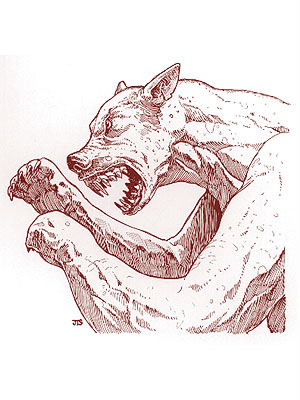
Juhrion
These huge, bear-like creatures are completely hairless, covered with a tough, reddish, leathery skin that is actually the detrimental effect of an Armour Legacy. They possess large teeth and short, harpoon-shaped claws. The juhrion normally travels about on all four feet, but it can rise up on its hind legs if it so desires. A juhrion's powerful growls and roars are very raspy and dry, rarely to be mistaken for those of another creature.
The Red Curse: Juhrions become Afflicted with the detriments of the Armour Legacy without ever gaining the actual powers. While cinnabryl could ward off the Affliction, they are seldom able to acquire this metal.
Combat: A juhrion will attack when defending its hunting area or hunting for food; they also attack Inheritors on sight. Though they move rather quietly for creatures of their bulk, the juhrion disregards further attempts at stealth and charges in to attack when a potential victim is in sight and is less than 10 yards away. Its movement rate increases from 12 to 18 for the short periods of fighting, allowing it to close the final distance quickly and possibly still surprise its victim.
These creatures attack with both claws and a bite, all three of which do considerable damage. The juhrion's claw attack also has a 50% chance of infecting the victim with vermilia (see the "Parasite" entry). They also employ a mauling attack, pinning another creature under its immense bulk while continuing to slash and bite. While the juhrion is using this attack, the victim no longer gets an AC bonus for Dexterity and cannot wield anything larger than a dagger against it. All spells are fouled, but Legacies function normally if movement is not required. The maul attack occurs if the juhrion successfully hits with both claws in a single round. To escape a mauling attack, the victim must make a successful bend bars roll.
Habitat/Society: Juhrions can roam an area as large as 10 square miles when hunting is sparse, but they do not usually range more than a few miles from their den. Juhrions will eat roots and berries, but only in times of dire need. They prefer rodents, cinnavixens, and voats. When possible, they seek out caves to live in, but they can make do with a hollowed out bed in a thicket.
After its second year, a juhrion takes mate; usually the male joins the female on her hunting grounds. They produce one or two young per season, always in the spring, keeping the cubs with them for one year. During the second year, the young are turned out to find their own hunting grounds.
Juhrions have a special hatred for Inheritors, whom they can smell up to a mile away. Juhrions seem to realise that Inheritors have a control over their Legacies that these creatures themselves lack, driving them into a frenzy of resentment. Cinnabryl might ease the resentment they hold for Inheritors, but few Inheritors will waste any of this precious metal on a juhrion.
Ecology: Juhrions are hunted by some humanoids for their skin, which makes a fine leather. The blood of a juhrion can also be made into a potion that will heal the effects of vermilia.
Cardinal ticks plague the juhrion like so
many other animals. Juhrions often develop a symbiotic relationship with the
Saragón Lyra bird, possibly the only creature that can safely
approach the huge beasts. Juhrions are immune to vermilia, but their claw
attacks often infect other creatures with this deadly bacteria.
